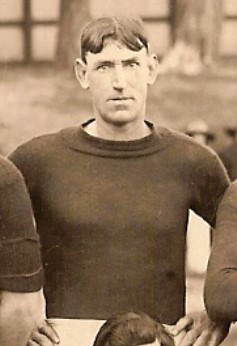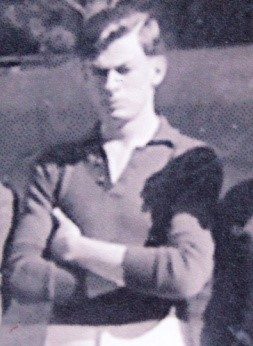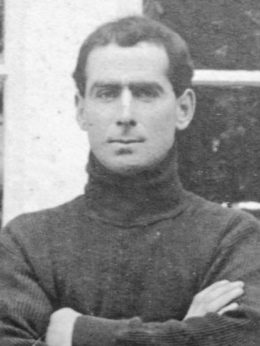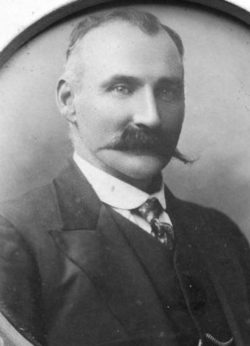By Lance Hodgins
Part Two
The final showdown
And so it comes down to a simple matter: which of two undefeated teams was the greatest … 1913 or 1948?
One team (1913) was at the end of a dominant ten years for Hastings. It was in the middle of a famous “three-peat”, going on to win another flag the following year. Only the Great War would put the local football competition, and the reign of Hastings, into recess.
The other team (1948) was the end product of a sporting build-up after a similar break for the Second World War. This was the third flag in yet another “three-peat”and was followed by a massive exodus of players to other teams, particularly to neighbouring Crib Point which had started up its own team in a rapidly-expanding competition.
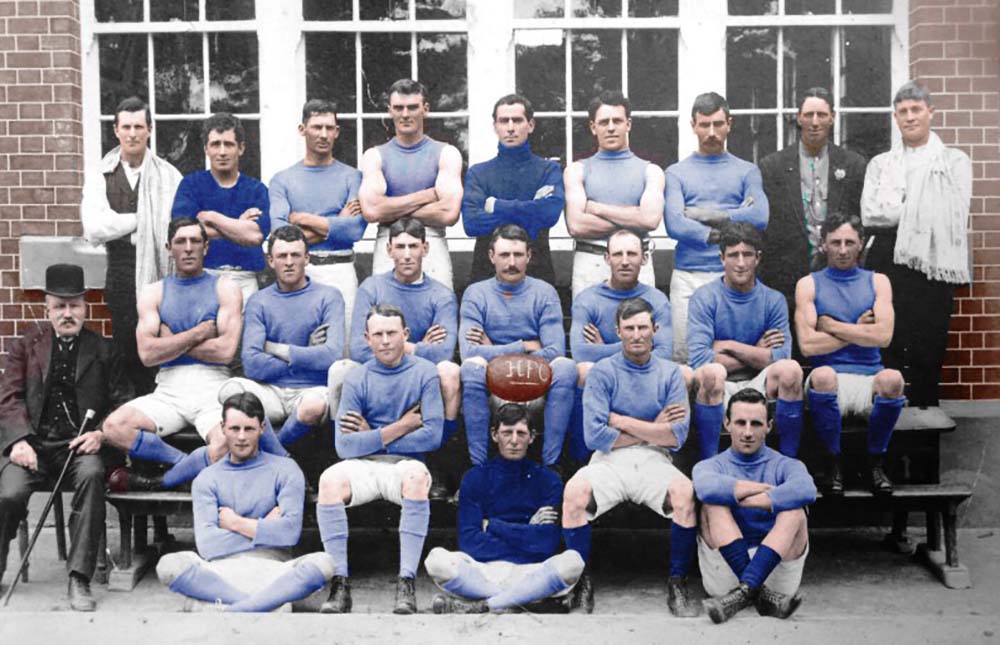
The personalities
Both teams had exceptional players, some of whom had starred on a larger stage.
In 1913 Len Incigneri was forging a 97-game VFL career with three different teams. Bert Francis had played for Melbourne the previous year. “Nipper” Floyd was halfway through his seventeen-years as reputedly the best footballer produced on this side of the Peninsula.
The 1948 team was built around young Jack Coleman, the “dead-shot” spearhead who smashed goalkicking records in the MPFL before becoming a legend in the Victorian Football League. His older brother Albert was an effective defender. Bob Stone had played several games with Melbourne FC and won the MPFL best & fairest that year. Jack Roberts was only 5’9” but a home-grown phenomenon who could dominate the ruck and was best on ground in the 1948 grand final.
Both teams had brilliant coaches: Jack Campbell and George Slocombe were experienced strategists and capable of cleverly leading teams of great footballers.
Let the scoreboard decide
Personalities aside, let’s consider some facts:
Each team outscored their opponents by approximately two to one.
YEAR – points for – points against
1913 – 544 – 240
1948 – 2039 – 986
In 1948 scores were twice as great and they played twice as many games, so it would be unwise to use the winning margins in their raw state. To use the size of each win as a measure of “dominance” needs to consider points FOR and AGAINST to calculate a percentage. Scores in finals are also included.
The result might surprise a few: the 1948 team finished with a massive 207% – but the 1913 team was even higher with 227%.
So there you have it. A close result – and one which is likely to draw an argument from many an old-timer who remembers their heroes of 1948.
My conclusion is that the “greatest” Hastings team of all time is the 1913 premiership side.
The 1913 season unfolds
The Peninsula Football Association expands to six teams for 1913 with the inclusion of Dromana and Naval Base, the latter hoping to find its footballers from the many fit young men who are building a major naval establishment at Crib Point.
Hastings are the reigning premiers and they have no trouble dispensing with Somerville by five goals in the opening match. This is followed by huge victories over the two new teams – Dromana and Naval Base.
Weather conditions on the next weekend are so bad that Mornington don’t even show up and Hastings are awarded the game 1 goal to nil.
The Blues then travel to Frankston and proceed to take them apart. They kick seven goals in the first quarter and finish with 13-22 to Frankston’s 4-4 … the biggest trouncing Frankston has been given for years. Curly McDonald’s place-kicking for goal amazes the crowd and is “a treat to witness”, whilst Pompey Francis and Hughie Carmichael are simply superb.
At the end of the first round Hastings remain undefeated and aggressive. Les Potts has already been rubbed out for two weeks for striking, and McDonald cops a belated tribunal hearing and a caution for striking an opposing player “witnessed by a whole pavilion full of Somerville spectators”.
A large crowd gathers at Hastings Park to see the locals take on Somerville for the second time. The Hastings big men dominate the game with the veteran “Nipper” Floyd best on ground and the Blues take a three goal victory.
The following week Dromana jump Hastings and hold them to a solitary point at quarter time, but then don’t score for the rest of the game whilst the Blues slam on 7-15. Len Incigneri is back with Hastings and plays a brilliant game. Bert Francis kicks 3 nice goals but he and Frank Robinson are both reported for rough play.
Fortunately Hastings take a well-earned break the following weekend, a bye caused by the withdrawal of the struggling Naval Base team. The game between Hastings and Mornington is looming and some expect that Hastings might finally have their colours lowered.
Both teams are at full strength and poor kicking from the Blues allows the Bulldogs to level the scores late in the final quarter. And then the unheard-of happens: a Hastings defender is clearing the ball across the face of goal with no one near him when he slips and his foot slices the ball through the Mornington goal. With only two minutes to go, Hastings are facing defeat as a result of their “own point”. The Blues finally score a goal which gives them the victory by 5 points.
The still undefeated Hastings team then hosts Frankston and a crowded train full of hopeful players and supporters arrive to do battle at Hastings Park. The locals keep their winning record intact and double Frankston’s score. It is a typically rugged encounter. Two burly followers, Carmichael and his Frankston opponent Harley, collide and are carried from the field unconscious. Both come back into the game, of course, and play quite well. Fortunately, neither would be needed for two weeks as the finals begin on the following Saturday and Somerville face Mornington in their semi-final, and beat them.
When the other semi-final rolls around it is Frankston and Hastings who meet again. From the bounce the experience of Francis, Reid, Denham and Moffatt produces two goals, but Frankston answer both and only a point separates the two sides at the first break. Cocky Jack snaps a goal from the ruck in the second term and Hastings lead 3-7 to 2-1 at half time.
In the third quarter, Denham kicks his second goal and Robinson adds another. Going into the final term, Hastings hold a good lead of almost 4 goals – and they are playing with confidence. Jack adds another goal and Frankston counters with one of their own, but the bell rings and it is all over. Hastings 8-13 (61) has defeated Frankston 4-5 (29) and finished their season.
Hastings are now ready to take on Somerville in the grand final at Frankston Park. Before that can take place, however, the Association delegates have to sort out some player eligibility issues. Mornington protests against two Somerville players and one is disqualified on non-residential grounds. An irate Somerville delegate retaliates by protesting that Hastings skipper Len Incigneri has not slept the mandatory four nights a week in the district and, furthermore, has not played the three games needed to qualify for the finals.
Hastings president JD Hodgins argues that Incigneri was, in fact, on the official team sheet for the game in which Mornington did not turn up. Furthermore, he argues that Incigneri is a farrier residing in Hastings and he should hardly be penalised for taking a few weeks’ holiday in Tasmania!
Come match day and Incigneri is in the midst of things right from the first bounce, defending vigorously and driving the ball forward. Francis passes to Denham right in front who notches a goal for the Blues and the score at quarter time is 1-1 to 0-2. Incigneri to Denham for Hastings’ second goal and at half time the Blues lead 2-5 to 0-4.
Somerville have yet to score a major but they are still in touch and came out firing, only to have Incigneri repeatedly turn back their attacks. Carmichael is knocked insensible for the second time in three weeks and taken off to Frankston hospital still unconscious. Slocombe has a shot for goal which falls short and from the resultant scrimmage McDonald kicks the ball through for a “sixer”. Hastings lead at the final break 3-8 to 0-6.
The fourth quarter is a frustrating one for Somerville. Their forward thrusts are repeatedly turned back by Francis, Floyd and Slocombe who are all playing brilliantly in defence. After a couple of minors from Hastings, Robinson kicks truly and the game ends with Somerville being kept score-less in the last term and goal-less for the entire match. The final scores are Hastings 4-10 (34) to Somerville 0-6 (6).
Len Incigneri was clearly the driving force behind Hastings’ grand win and he is widely recognized as best on ground. “Pompey” Francis played another solid game and was the best of the rest and Will Denham played well up forward, finishing with two of Hastings’ four goals.
Others to do well for Hastings were Reid, Sposito, McDonald, the Floyd brothers, Lothian and Moffatt. The skipper Campbell led by example and the club secretary, Harry Kerr, wore the biggest smile for his “bonzer” team.
Nonetheless, the Blues had to fight for their premiership. At the next Association meeting the Somerville delegate jumped on Hastings for having played Incigneri in the final match. He claimed that they had broken rules 8,9,10 and 28, and that the match should therefore be awarded to Somerville with the option, of course, of a challenge from minor premiers Hastings.
Delegate Hodgins called for a ruling from the chair, claiming that due notice of the protest had not been given. The president, Mr Ritchie, declared the protest was out of order and Hastings was officially declared the 1913 premiers by the Peninsula Football Association.
After business, the delegates adjourned to the hotel dining room which had already been festooned in blue and white. In responding to the toast to Hastings as premiers, JD Hodgins said that his team had put up a record as this was the only season a team had gone through without a defeat. The football had been good, and he had heard city men comment favourably on the high standard of play on the Peninsula.
He pointed out that his team was a purely honorary one. Not one man received a penny for his services – which he thought had a good deal to do with their success. He had always found that men never play as well for money as they do for honour.
In the years that followed, many were asking whether this was the best Hastings side ever seen. They had gone through the entire season undefeated and, in facing their closest rivals in the final match, had held them goal-less.
Most agreed with the idea.
To be continued next week…


